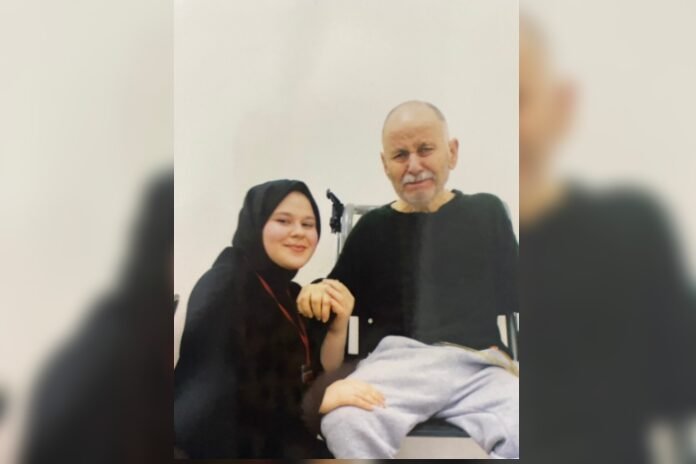İbrahim Güngör, a 73-year-old Alzheimer’s patient whose deteriorating health raised concerns about his continued imprisonment, was hospitalized on July 25 after contracting an infection, his daughter said Monday.
Güngör, who also suffers from diabetes and prostate problems, has been a patient at İzmir City Hospital for approximately 10 days and his condition is reportedly poor, according to his daughter, Rümeysa Güngör, who posted the information on X on August 4.
“On July 25, a Friday, we went for our scheduled prison visit. He was visibly unwell; he fainted during the visit,” Rümeysa wrote. “A doctor examined him and said there was nothing wrong. By that evening he had been admitted to the hospital. A catheter was inserted because he could no longer manage bathroom needs or personal care. An infection was inevitable.”
“We visited again today [Monday]. He didn’t speak. He didn’t recognize me, thought I was my sibling,” she wrote. “What did my father do to deserve this? Where is the justice in keeping someone like him behind bars?”
Güngör, sentenced to over eight years, was arrested on December 14, 2024 and sent to prison in İzmir after Turkey’s Supreme Court of Appeals upheld his conviction.
Charges against Güngor include hosting religious gatherings with the members of the Gülen movement, encouraging participation in movement activities and collecting donations for students. He was director of student affairs at İzmir Gediz University, a Gülen-linked institution that was closed under a government decree after a 2016 coup attempt.
Turkish President Recep Tayyip Erdoğan has been targeting followers of the Gülen movement, inspired by the late Muslim cleric Fethullah Gülen, since corruption investigations revealed in 2013 implicated then-prime minister Erdoğan and some members of his family and inner circle.
Dismissing the investigations as a Gülenist coup and a conspiracy against his government, Erdoğan began to target the movement’s members. He designated the movement as a terrorist organization in May 2016 and intensified the crackdown on it following the abortive putsch in July of the same year that he accused Gülen of masterminding. The movement strongly denies involvement in the coup attempt or any terrorist activity.
In 2022, before his imprisonment, he underwent brain surgery for hydrocephalus, an abnormal buildup of cerebrospinal fluid deep within the brain, and a shunt was implanted to alleviate the pressure.
His daughter previously described the unsanitary conditions of his confinement as unsuitable for someone in his condition. “He can’t manage basic personal care like bathing or changing clothes,” she said. “At home, he couldn’t even use the bathroom alone due to balance issues. If he falls in that cell, no one will be there to help him. We fear for his life.”
Turkish authorities have frequently been criticized for their systematic disregard of the health needs of prisoners. Every year, rights groups report the death of dozens of sick prisoners, either while behind bars or shortly after their release, which often comes at the end-stage of their illness. Turkey recorded 709 deaths in prison in the first 11 months of 2024, according to data from the Ministry of Justice shared in response to a parliamentary inquiry.















